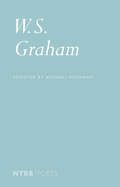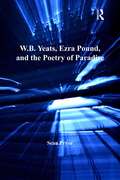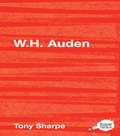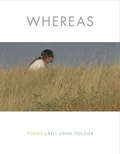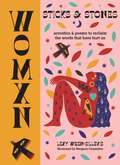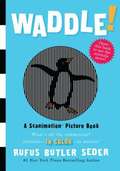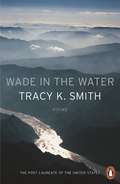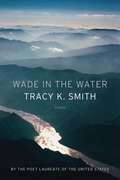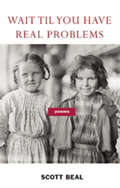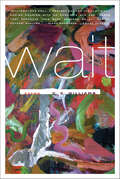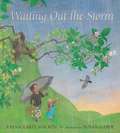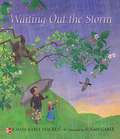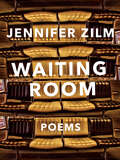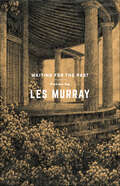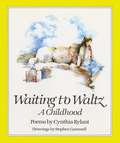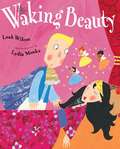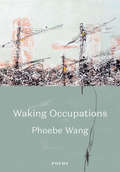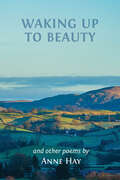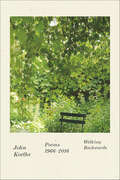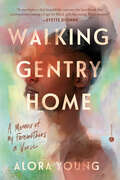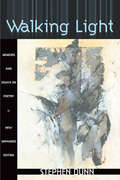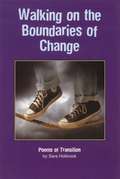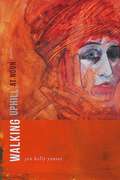- Table View
- List View
W. S. Graham: Selected Poems
by Michael Hofmann W. S. GrahamAn original collection of the best and most provocative work by Scottish poet W.S. Graham, the celebrated author of "Nightfishing" and Malcolm Mooney's Land. “Does it disturb the language?” the Scottish poet W. S. Graham liked to ask about a poem. Graham’s do—strangely, comically, beautifully. His career fell into two parts. The early work is rapt and wild and incantatory, and culminates in the tour de force of 1955, The Nightfishing. Fifteen years of silence were then followed by an extraordinary late flowering: Graham’s poems became stark, quizzical, and unsettling, a continual teasing examination of thought and feeling that is also an ongoing investigation into the nature and power of poetry, work that is at once metaphysical and intimate, wry and elegiac. In these late poems, Graham emerges as one of the true originals of poetry in English.
W.B. Yeats, Ezra Pound, and the Poetry of Paradise
by Sean PryorEmphasizing the interplay of aesthetic forms and religious modes, Sean Pryor's ambitious study takes up the endlessly reiterated longing for paradise that features throughout the works of W. B. Yeats and Ezra Pound. Yeats and Pound define poetry in terms of paradise and paradise in terms of poetry, Pryor suggests, and these complex interconnections fundamentally shape the development of their art. Even as he maps the shared influences and intellectual interests of Yeats and Pound, and highlights those moments when their poetic theories converge, Pryor's discussion of their poems' profound formal and conceptual differences uncovers the distinctive ways each writer imagines the divine, the good, the beautiful, or the satisfaction of desire. Throughout his study, Pryor argues that Yeats and Pound reconceive the quest for paradise as a quest for a new kind of poetry, a journey that Pryor traces by analysing unpublished manuscript drafts and newly published drafts that have received little attention. For Yeats and Pound, the journey towards a paradisal poetic becomes a never-ending quest, at once self-defeating and self-fulfilling - a formulation that has implications not only for the work of these two poets but for the study of modernist literature.
W.H. Auden (Routledge Guides to Literature)
by Tony SharpeAs both a politically engaged and stylistically versatile poet, W.H. Auden is one of the most influential writers of the twentieth century. His work is not only widely studied and read, but has been used in musical scores and quoted in Hollywood films. This guide to Auden’s compelling work offers: an accessible introduction to the contexts and many interpretations of Auden’s texts, from publication to the present an introduction to key critical texts and perspectives on Auden’s life and work, situated in a broader critical history cross-references between sections of the guide, in order to suggest links between texts, contexts and criticism suggestions for further reading. Part of the Routledge Guides to Literature series, this volume is essential reading for all those beginning detailed study of W.H. Auden and seeking not only a guide to his works but also a way through the wealth of contextual and critical material that surrounds them.
WHEREAS: Poems
by Layli Long SoldierThe astonishing, powerful debut by the winner of a 2016 Whiting Writers' AwardWHEREAS her birth signaled the responsibility as mother to teach what it is to be Lakota therein the question: What did I know about being Lakota? Signaled panic, blood rush my embarrassment. What did I know of our language but pieces? Would I teach her to be pieces? Until a friend comforted, Don’t worry, you and your daughter will learn together. Today she stood sunlight on her shoulders lean and straight to share a song in Diné, her father’s language. To sing she motions simultaneously with her hands; I watch her be in multiple musics.—from “WHEREAS Statements”WHEREAS confronts the coercive language of the United States government in its responses, treaties, and apologies to Native American peoples and tribes, and reflects that language in its officiousness and duplicity back on its perpetrators. Through a virtuosic array of short lyrics, prose poems, longer narrative sequences, resolutions, and disclaimers, Layli Long Soldier has created a brilliantly innovative text to examine histories, landscapes, her own writing, and her predicament inside national affiliations. “I am,” she writes, “a citizen of the United States and an enrolled member of the Oglala Sioux Tribe, meaning I am a citizen of the Oglala Lakota Nation—and in this dual citizenship I must work, I must eat, I must art, I must mother, I must friend, I must listen, I must observe, constantly I must live.” This strident, plaintive book introduces a major new voice in contemporary literature.
WOMXN: Acrostics and Poems to Reclaim the Words that Have Hurt Us
by Lexy Wren-Sillevis"There are so many words, insults, labels and boxes for women to be packaged and packed off in. Often, but not always, they're words coined by men. Why that is, is a bigger conversation that is starting to be had by women everywhere. We're slowly, but oh-so-surely, making it clear that there is no man in womxn. We're writing him out and writing us back in, and we deserve a suffix all of our own that is free from patriarchal roots. So from here on in, we are WOMXN."Sticks and Stones is a powerful reclamation of the slurs and insults thrown at women for centuries. It's a righting of wrongs - a rewriting of sexist, belittling and shaming language. It's a tool for breaking free from the stereotypes and impossible standards used to confine women, transforming them into messages of resilience and resolve. And, most importantly, it's a rallying call for change, healing and empowerment.It takes the words, slurs, insults and labels that are used to diminish women every day and breaks them down and tears them apart. It transmutes and rewrites these words - sometimes with all of the pain they trigger, sometimes in the form of positive affirmations, mantras and poems - all told in acrostics.With their underlying meditative rhythms, these acrostics are also a remedy for healing wounds and empowering women to have the confidence to be their true selves. You can dip in and out, or read it cover to cover. You can come back to, and work through, any words that resonate with you. Lexy also offers clearing meditations at the back of the book to help you tackle the words that hurt you most, helping to remove them from your past, present and future.This title is illustrated by the hugely talented illustrator and print maker Margaux Carpentier. Margaux creates pictures using a symbolic language, so each piece has its own unique message for every individual. Her work is inspired by all the incredible colours of the world. She adapts her illustrations in 3D and large-scale murals, the most recent of which is currently on display in Brown Hart Gardens in Mayfair, London.
WOMXN: Acrostics and Poems to Reclaim the Words that Have Hurt Us
by Lexy Wren-Sillevis"There are so many words, insults, labels and boxes for women to be packaged and packed off in. Often, but not always, they're words coined by men. Why that is, is a bigger conversation that is starting to be had by women everywhere. We're slowly, but oh-so-surely, making it clear that there is no man in womxn. We're writing him out and writing us back in, and we deserve a suffix all of our own that is free from patriarchal roots. So from here on in, we are WOMXN."Sticks and Stones is a powerful reclamation of the slurs and insults thrown at women for centuries. It's a righting of wrongs - a rewriting of sexist, belittling and shaming language. It's a tool for breaking free from the stereotypes and impossible standards used to confine women, transforming them into messages of resilience and resolve. And, most importantly, it's a rallying call for change, healing and empowerment.It takes the words, slurs, insults and labels that are used to diminish women every day and breaks them down and tears them apart. It transmutes and rewrites these words - sometimes with all of the pain they trigger, sometimes in the form of positive affirmations, mantras and poems - all told in acrostics.With their underlying meditative rhythms, these acrostics are also a remedy for healing wounds and empowering women to have the confidence to be their true selves. You can dip in and out, or read it cover to cover. You can come back to, and work through, any words that resonate with you. Lexy also offers clearing meditations at the back of the book to help you tackle the words that hurt you most, helping to remove them from your past, present and future.This title is illustrated by the hugely talented illustrator and print maker Margaux Carpentier. Margaux creates pictures using a symbolic language, so each piece has its own unique message for every individual. Her work is inspired by all the incredible colours of the world. She adapts her illustrations in 3D and large-scale murals, the most recent of which is currently on display in Brown Hart Gardens in Mayfair, London.
Waddle!
by Rufus Butler SederCreated by the optical genius behind the phenomenal "New York Times"-bestselling children's books "Gallop!" and "Swing!, Waddle!" teaches color and movement through the unique Scanimation process--a technique that brings the animals to life.
Wade In The Water: Poems
by Tracy K. SmithIn Wade in the Water, Pulitzer Prize-winning poet Tracy K. Smith's signature voice - inquisitive, lyrical and wry - turns over what it means to be a citizen, a mother and an artist in a culture arbitrated by wealth, men and violence. <P><P>The various connotations of the title, taken from a spiritual once sung on the Underground Railroad which smuggled slaves to safety in 19th-century America, resurface throughout the book, binding past and present together. <P><P>Collaged voices and documents recreate both the correspondence between slave owners and the letters sent home by African Americans enlisted in the US Civil War. <P>Survivors' reports attest to the experiences of recent immigrants and refugees. Accounts of near-death experiences intertwine with the modern-day fallout of a corporation's illegal pollution of a major river and the surrounding land; and, in a series of beautiful lyrical pieces, the poet's everyday world and the growth and flourishing of her daughter are observed with a tender and witty eye. <P>Marrying the contemporary and the historical to a sense of the transcendent, haunted and holy, this is a luminous book by one of America's essential poets.
Wade in the Water: Poems
by Tracy K. SmithShortlisted for the T. S. Eliot PrizeFinalist for the Forward Prize for Best CollectionThe extraordinary new poetry collection by Tracy K. Smith, the Poet Laureate of the United StatesEven the men in black armor, the onesJangling handcuffs and keys, what elseAre they so buffered against, if not love’s bladeSizing up the heart’s familiar meat?We watch and grieve. We sleep, stir, eat.Love: the heart sliced open, gutted, clean.Love: naked almost in the everlasting street,Skirt lifted by a different kind of breeze.—from “Unrest in Baton Rouge”In Wade in the Water, Tracy K. Smith boldly ties America’s contemporary moment both to our nation’s fraught founding history and to a sense of the spirit, the everlasting. These are poems of sliding scale: some capture a flicker of song or memory; some collage an array of documents and voices; and some push past the known world into the haunted, the holy. Smith’s signature voice—inquisitive, lyrical, and wry—turns over what it means to be a citizen, a mother, and an artist in a culture arbitrated by wealth, men, and violence. Here, private utterance becomes part of a larger choral arrangement as the collection widens to include erasures of The Declaration of Independence and the correspondence between slave owners, a found poem comprised of evidence of corporate pollution and accounts of near-death experiences, a sequence of letters written by African Americans enlisted in the Civil War, and the survivors’ reports of recent immigrants and refugees. Wade in the Water is a potent and luminous book by one of America’s essential poets.
Wait 'Til You Have Real Problems
by Scott BealWait 'Til You Have Real Problems, the emotionally charged debut poetry collection from Scott Beal, tackles love and loss in a series of thematically linked pieces that will leave readers breathless. Beal finds inspiration in everything from myth to fairytale, from old photographs to the origin of chicken noodle soup--but always, ultimately, from the core of something unmistakably human.
Wait: Poems
by C. K. WilliamsWait finds C. K. Williams by turns ruminative, stalked by "the conscience-beast, who harries me," and "riven by idiot vigor, voracious as the youth I was for whom everything was going too slowly, too slowly." Poems about animals and rural life are set hard by poems about shrapnel in Iraq and sudden desire on the Paris Métro; grateful invocations of Herbert and Hopkins give way to fierce negotiations with the shades of Coleridge, Dostoevsky, and Celan. What the poems share is their setting in the cool, spacious, spotlit, book-lined place that is Williams's consciousness, a place whose workings he has rendered for fifty years with inimitable candor and style.
Waiting Out the Storm
by JoAnn Early MackenWind whistles in the treetops, thunder rumbles, and lightning flashes and dashes between raindrops. Snug inside, a mother and child listen, watch, and wonder what the animals will do during the storm. Paired with beautiful illustrations evoking the moods and mysteries of the natural world, this lyrical call-and-response text is a lullaby to stormy weather — and to the warmth and safety of home.
Waiting Out the Storm (Elementary Core Reading)
by Susan Gaber JoAnn Early MackenNIMAC-sourced textbook
Waiting Room
by Jennifer ZilmYou’re welcome to take a seat in (the) Waiting Room, the first full-length collection of poetry from award-winning writer Jennifer Zilm. Featuring a mélange of styles and forms (sonnets, erasures, unsent emails, footnotes, session notes, CVs, tweets, and other disparate source materials—including, the Gospels and the Dead Sea Scrolls), Waiting Room subverts, shares, and repurposes the vocabularies of psychiatry, dentistry, the Bible, and academia in a humorous investigation of the contained intimacy of appointments and therapeutic relationships. Ultimately interested in how we learn, the experimental and lyrical poems in Waiting Room seek lessons in what it means to wait, to be a patient and to be patient, to be a student and to be a teacher, to be a healer and to be healed. In four unique sections, Zilm invites readers to investigate the curious boundaries of various therapeutic terrains—from an exploration of the esoteric world of graduate school, where the subject is religion, to a mash-up of Dante’s vision of purgatory and Vancouver’s Downtown Eastside (DTES), to the improbable written intersections of van Gogh's doctors and Sylvia Plath's therapist.Lovers of avant-garde and lyrical poetry will immediately connect with Zilm's engaging, observant, and probing work, as will readers familiar with the realms of Vancouver's neighbourhoods, in particular the DTES. And because of its many idiomatic forms (e.g., emails, tweets, recipes, etc.), its integration of a wide range of source materials, and its relatable settings and subject matter, Waiting Room could serve as a "gateway collection" for readers who don’t always connect with poetry, but enjoy other forms of literature.
Waiting for the Past: Poems
by Les MurrayA new collection of poems from Les Murray that renews and transforms the contemporary world through languageIn Waiting for the Past, Les Murray employs his molten sense of language to renew and transform our experience of the world. With quicksilver verse, he conjures his rural past, the life of the poor dairy boy in Australia, as he simultaneously feels the steady tug of aging, of time pulling him back to the present. Here, syntax, sense, and sound combine with such acrobatic grace that his poems render the familiar into the unknown, the unknown into the revelatory. Whether Murray is writing about a boy on a walkabout hiding from grief, a sounding whale “spilling salt rain,” or leaves that “tread on the sky,” the great Australian poet’s sense of wonder, his ear for the everyday, his swiftness of thought, are everywhere in these pages. As Derek Walcott said of Murray’s work, “There is no poetry in the English language now so rooted in its sacredness, so broad-leafed in its pleasures, and yet so intimate and conversational.”
Waiting to Waltz: A Childhood
by Cynthia Rylant[from front flap] "Their house had no number and no street, but the girl and her mother were glad to pick up their mail at the Beaver Post Office. It was good they could do that ... meant they were known in town. The girl made poems about those who knew her: grown-ups such as Mr. Lafon, who was too timid to drive a car but brave enough to walk wearing a net mask among a thousand bees. Or Major, a collie dog; Mrs. Todd, who kept a pet monkey at her hardware store; or quiet Mr. Dill, who left Beaver three years before anyone noticed. And kids: Ronnie from next door, who played trombone, Randy who played Tarzan. Jo and Sue and Roger and Steve and Jimmy--boyfriends and girlfriends--growing together, and up, and away."
Wakefulness: Poems
by John AshberyA collection of poems that recall, in their powerful transformations of language, the moment of clarity that arrives upon waking from a dreamOne of John Ashbery&’s most critically acclaimed collections since his iconic works of the mid-1970s, Wakefulness was praised in 1999 for its beauty and alertness. In these pages, the great poet is at once luring the reader into a vivid dream and waking us up with a jolt of recognition. In poems such as &“The Village of Sleep,&” &“Shadows in the Street,&” and &“Wakefulness,&” dreams, sleeplessness, and other transformational and liminal states are revealed to be part of a ceaseless continuity of accelerating changes. Even the most seemingly familiar phrases (&“stop me if you&’ve heard this one&”) are ever in the process of changing their meanings, especially in Ashbery&’s hands. And distinctive new realities are created constantly by the power of words, in strange and beautiful combinations. With every word and every line, Ashbery questions the real and summons a new reality.
Waking Beauty
by Leah WilcoxEveryone knows Sleeping Beauty has to be woken with a kiss, except Prince Charming. Every time the fairies watching over her try to tell him, he interrupts with his ideas of how to wake her.
Waking Occupations: Poems
by Phoebe WangThe second collection from the acclaimed author of Admission Requirements. This astonishing new collection of poems contemplates our obligations to live in a creative, generative, and revolutionary way amid a cascade of global contingencies. In a four-part meditation on what it means to live on occupied land and in colonial time, the subject of these poems has moved beyond arriving and departing and wakes each day to meet her commitments and to heal from complicities, exclusions, difficult truths and the pandemic of forgetting. It follows the figure of the female artist as a time-travelling woman, embodied by mother and daughter, through the gallery of memory. The poems enact brief encounters with objects, events, and works of art that hold us accountable. Finally, a set of shadow elegies mourn what the next generation has already lost, while searching for traces of the wild and for ceremonies that might mend us. Waking Occupations is an urgent, essential collection that considers what we carry from previous generations and our liabilities to the cyclical nature of the work that uplifts us.
Waking Up to Beauty
by Anne HayPoems are small individual vignettes. Each one telling a story and painting a picture. Poetry is a special art form. People from all walks of life can express themselves and their thoughts through poetry. Sometimes a memory triggers an emotion: if you like to write poetry, then there is no better way to express a moment in time than to write the words that give a poem life. Poetry can be funny, it can be serious, it can be about love, it can be about sorrow. Poems can be about so much: about the sea, about rivers, about snow, and the warm glow in the fireplace, at home, in the deep mid-winter. Poetry lets us feel the emotion and view the scene in our own minds, through the vision of the poet. Read on…
Walking Backwards: Poems 1966–2016
by John KoetheCollected poems from America’s searching and thoughtful philosopher-poet. . . There’s somethingComforting about rituals renewed, even adolescents’ pipe dreams:They’ll find out soon enough, and meanwhile find their placesIn the eternal scenery, less auguries or cautionary talesThan parts of an unchanging whole, as ripe for contemplationAs a planisphere or the clouds: the vexed destinies, the shared life,The sempiternal spectacle of someone preaching to the choirWhile walking backwards in the moment on a warm spring afternoon.John Koethe’s poems—always dynamic and in process, never static or complete—luxuriate in the questions that punctuate the most humdrum of routines, rendering a robust portrait of an individual: complicated, quotidian, and resounding with truth. Gathering for the first time his impressive and award-winning body of work, published between 1966 and 2016, Walking Backwards introduces this gifted poet to a new, wider readership.
Walking Gentry Home: A Memoir of My Foremothers in Verse
by Alora YoungAn &“extraordinary&” (Laurie Halse Anderson) young poet traces the lives of her foremothers in West Tennessee, from those enslaved centuries ago to her grandmother, her mother, and finally herself, in this stunning debut celebrating Black girlhood and womanhood throughout American history.&“A masterpiece that beautifully captures the heartbreak that accompanies coming of age for Black girls becoming Black women.&”—Evette Dionne, author of Lifting as We Climb, longlisted for the National Book AwardWalking Gentry Home tells the story of Alora Young&’s ancestors, from the unnamed women forgotten by the historical record but brought to life through Young&’s imagination; to Amy, the first of Young&’s foremothers to arrive in Tennessee, buried in an unmarked grave, unlike the white man who enslaved her and fathered her child; through Young&’s great-grandmother Gentry, unhappily married at fourteen; to her own mother, the teenage beauty queen rejected by her white neighbors; down to Young in the present day as she leaves childhood behind and becomes a young woman. The lives of these girls and women come together to form a unique American epic in verse, one that speaks of generational curses, coming of age, homes and small towns, fleeting loves and lasting consequences, and the brutal and ever-present legacy of slavery in our nation&’s psyche. Each poem is a story in verse, and together they form a heart-wrenching and inspiring family saga of girls and women connected through blood and history.Informed by archival research, the last will and testament of an enslaver, formal interviews, family lore, and even a DNA test, Walking Gentry Home gives voice to those too often muted in America: Black girls and women.
Walking Light: Memoirs and Essays on Poetry (American Readers Series)
by Stephen DunnCommitted to exploring the role of poetry and poets in our culture, Stephen Dunn provides new, expanded versions of the essays originally published by W. W. Norton in 1993, now out of print. In Walking Light, Dunn discusses the relationship between art and sport, the role of imagination in writing poetry, and the necessity for surprise and discovery when writing a poem. Humorous, intelligent and accessible, Walking Light is a book that will appeal to writers, readers, and teachers of poetry.Stephen Dunn is the author of eleven collection of poetry. He teaches writing and literature at the Richard Stockton College in Pomona, New Jersey, and lives in Port Republic, New Jersey.
Walking On The Boundaries Of Change: Poems Of Transition
by Sara HolbrookA collection of poems for young adults about new experiences and difficult choices.
Walking Uphill at Noon: Poems (Mary Burritt Christiansen Poetry Series)
by Jon Kelly YenserWalking Uphill at Noon showcases Yenser&’s mastery of prosody and love of play. Including free verse as well as established and newly invented forms, Yenser&’s collection is organized into four parts that each explore the author&’s life and interests: part 1 focuses on neighborhood observations; part 2 delves into travel at home and abroad; part 3 consists of a &“walking log&” that muses on current events; and part 4 explores magic, mysteries, and sleights of hand. Ultimately, Yenser urges readers to consider that everyday situations can be made extraordinary if they keep their love of play and wonder close to their hearts.
